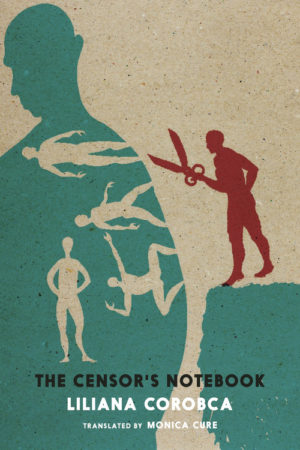You have no items in your cart. Want to get some nice things?
Go shopping
There is a secret notebook written by a woman in her mid-thirties who is working as a censor in a country where every typewriter is registered. It is 1974, Ceaușescu has just been “elected” to the post of Romania’s president for life and the intelligence service Securitate is as omnipresent and powerful as ever. Amidst an increasing nationalism, fierce hatred towards bourgeois morality with its outdated values and a general ban on expressions of pessimism, an institution is tasked to keep the minds of Romanians clean of these ills. Officially it doesn’t exist and neither does the notebook that we are about to read.
The Censor’s Notebook offers an immersive experience into a polyphony of voices; fragments from manuscripts; quotes from official guidance, rules of conduct and other “most important documents”; useful everyday tips from novels for how to get long lice-free silky hair by washing with gasoline. They are captured by a censor, Filofteia Moldovean, along with her reflections on her job and her working environment, ranging from sarcastic to desperate; her painful childhood and young adult memories; dream (and nightmare) diaries and a lot more. It’s a staccato monologue of high intensity meanderings between mad poetry, literary essay, political thriller, and a profound meditation on power. Who did she write it for? How did she muster the courage to write with such pure honesty? Is she trying to misdirect the other agents of the secret state in whose hands the notebook may end up? Is the reader part of some obscure plot?
The Censor’s Notebook starts off as a game with the reader’s mind. It is 2016 and Liliana, the writer, receives an email from the former head of the administrative service of the state censorship who smuggled it out of Romania when she emigrated to West Germany. She offers to donate the notebook to the “Museum of Communism.” The writer eagerly agrees, duly receives and reads the Reader Notebook, Filofteia Moldovean, Literature and Art Division, 1974.
A “prototypical 1950s office worker (and censor)” who spoke rarely, read a lot and embarrassed everyone by her diligence, Filofteia transforms from a prudish divorcee, who bears the name of a saint who died at the age of 12, to a complex protagonist. Part of her appears to be seriously tormented by inadequate ideological instructions and guidance on how to deal with the hostile content that comes through her hands. But her quest for the freedom to censor whatever she wants is balanced by a sardonic wit, with which she observes the institution of censorship, the world of literature and the tightly controlled society around her. Can a person be this sharp and honest, and simultaneously mindbogglingly eager to serve as a cog in a dubious political machine? Could she really like her censorship job or is she “wasting her life away”?
Refreshingly, in Corobca’s novel we get to see the operation of the censorship system from the perspective of a female protagonist uniquely placed to observe the grotesque daily machinations. Descriptions of big-headed opportunistic bosses, cruel brothers, or Securitate officers turn the novel in parts into a parody. It is complemented by office gossip – mostly focusing on the conquests of Filofteia’s beautiful colleague Roza, musings on the physical attractiveness of poets, and pieces of advice obtained from literature; “If he puts his hand on your rear, his intentions aren’t serious… Baking soda is a very effective and very cheap way to combat perspiration.” They are seamlessly interwoven into the text almost as if Filofteia delivered them in one breath with her cynical commentaries about the poor quality of the literature she is censoring.
In the novel, Corobca captures the period of censorship in Romania that was – at least on paper – regulated by government decrees and regulations, rather than the fear and self-censorship that ensued after the restructuring of censorship in 1977. As the novel progresses, perceptive Filofteia signals that it is really the minds of the readers that need to be controlled, more than the texts of the writers. Literature lovers are the real rebels and therefore the control needs to happen right there – in our heads. In this way, the novel taps into one of the present prominent discussions on how to preserve freedom of thought, which is so fundamental to our being.
An authoritarian state, or any state for that matter, needs intellectuals to carry out the “dirty work” of politics of literature. They do so much less for fame, money or even security than we may have thought. Reading Corobca’s novel we get to see the personal trajectories of censors as almost banal and sad. Despite her incredulous declarations of love for censorship, Filofteia’s predicament to what seems like a life-long career is marked by a series of traumatic events, which she dumps on the reader like tactical nuclear bombs: Memories of the father she never knew; the cruelty of her opportunistic brothers who searched the forests to hunt the “enemies of the people;” and the unrequited love that went terribly wrong. Free of self-pity, she opens up to the notebook and puts a mirror to the facets of abusive power.
For a contemporary reader The Censor’s Notebook offers much more than a story from the past of an obscure closed off Eastern European country. Corobca has researched and written about the issue of censorship extensively, and is able to embody the mind of an individual who is supposed to serve it. Her reminders about constant surveillance and the indispensable value of any little bit of privacy resonate strongly in today’s reality, where our behaviour, wishes and hopes, and even intentions are monitored, captured and processed, albeit perhaps less by intelligence services and more by tech-powered private entities.
While Filofteia makes some non-sentimental observations about the power to control everything including minds, she also notices her own “schizotude” and her doppelganger. The person who is dangerous because she reads. This image resonates with observations of Romanian-born Nobel Prize-winning writer, Herta Müller, as well as those of anthropologist, Katherine Verdery, who both discovered similar doppelgangers when reading their Securitate files after the fall of the regime. Although they didn’t recognize themselves in these doubles, the powerful institutions of the secret state consider their existence and their hostility to the regime a fact. The mere act of free thinking can turn one into an enemy of the people.
The fact that this novel draws on extensive archival research also opens up the question of what makes a critical scrutiny of state control and censorship practices possible. To what extent are we, as contemporary readers, free from various forms of “justified interventions” of invisible censors? And if we are not free from them, are we ever going to learn about it one day? Corobca’s novel makes a strong case for the need to de-classify censorship archives and secret state files for a debate about the freedom of thought and expression.
Monica Cure, who translated the novel, deserves particular praise. A poet and writer herself, she not only maintains a sense of poetry and the anxious pace of Filofteia’s tangential monologues, but also brings to life excerpts from poems, summaries of foreign novels (not recommended for import), dictionary entries, and newspaper clippings. She also manages to convey a surreal atmosphere and sense of irony. In the translator’s note, she contemplates on how much she might have unwittingly censored Corobca’s novel through the translation. This is perhaps the question that could have been given to the author or the editor of the original text – would a bit of cutting down on some of the repetitive reflections of the protagonist and the lengthy summaries or transcripts of the government decrees and Action Plans improve the text for the benefit of the reader, or would they have amounted to censorship? It is hard to tell. The novel engages the reader in a game and the temptation to “edit”, “censor” or “change it” might well be part of the author’s intention.
By Liliana Corobca,
Translated from the Romanian by Monica Cure
Seven Stories Press, 496 pages
Barbora Cernusakova
Barbora Černušáková is London-based human rights researcher and writer. She is currently working on a manuscript of non-fiction about Roma workers in the Czech Republic.




